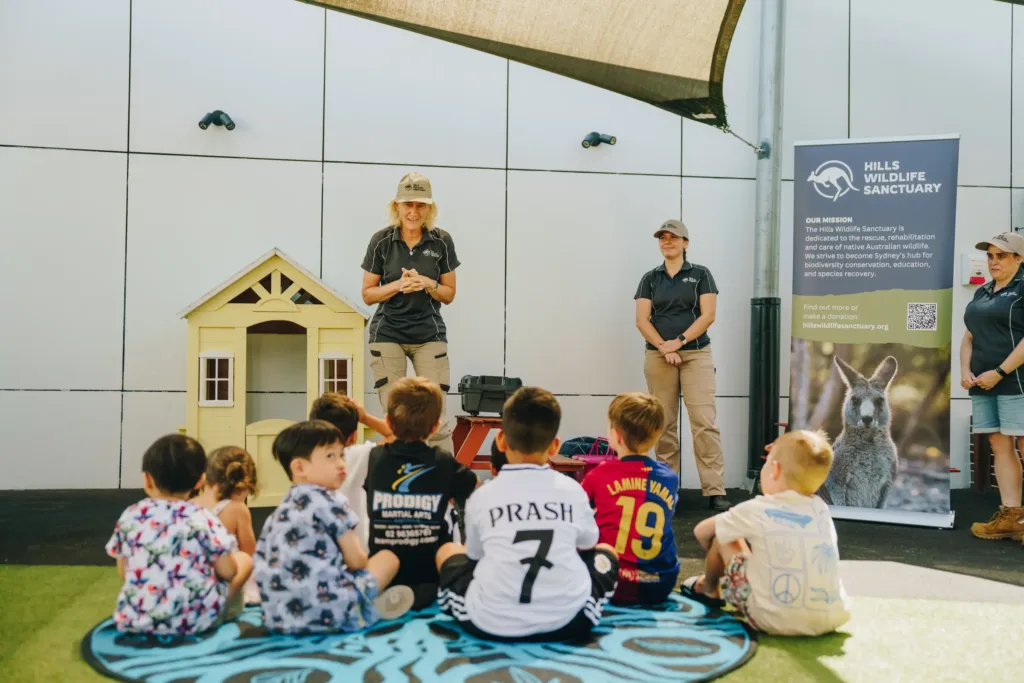At Learning Blocks Dural, we believe every child’s world should be filled with curiosity, kindness, and connection. One of the most beautiful ways to nurture this is through experiences with animals. That’s why our partnership with Hills Wildlife Sanctuary is so special. It gives children the chance to meet and care for native Australian animals in a safe and meaningful way, creating memories that last far beyond the classroom.
These visits aren’t just about seeing animals up close. They’re about teaching children to care – for the environment, for living things, and for each other. Each gentle interaction lays the foundation for values that will stay with them for life.
The Gentle Power of Curiosity
There’s something magical about the moment a child comes face to face with an animal they’ve only ever seen in storybooks or picture cards. When a child sees a wombat up close or gently strokes the soft fur of a wallaby, something shifts. Their eyes light up with wonder, their little hands reach forward with care, and their natural curiosity comes alive.
Curiosity is one of the strongest tools for learning at this age. Animals invite children to ask questions, notice details, and explore the world with open eyes. They begin to wonder where the animals live, what they eat, and how they move. They notice the sound of a bird’s call, the texture of a reptile’s skin, or the way a kangaroo hops.
These moments aren’t just fun – they’re powerful. They build the foundations of respect, patience, and care. Children learn that living things need to be treated gently, just as we treat our friends and family with kindness.
Learning Through Real Encounters
The Hills Wildlife Sanctuary visits bring the natural world right into the heart of our centre. For many children, it may be their very first time meeting a native animal in person. These encounters provide learning that no book, screen, or classroom activity can fully capture.
From observing how animals move to hearing stories about their habitats, children gain hands-on experiences that connect learning with real life. It’s one thing to read about an echidna, but it’s something else entirely to watch one scurry about and curl into a ball. These live experiences spark conversations, laughter, and learning that stay with children long after the day is over.
When carers from the sanctuary share stories, children begin to connect facts with feelings. They don’t just learn that koalas eat eucalyptus leaves – they also see how gently the animal chews, and how carefully it’s handled. These sensory-rich moments help children develop empathy, an essential skill for both learning and life.
Activities that Inspire at Home
The lessons don’t stop when the animals return to the sanctuary. Families often notice their children carrying these ideas into their everyday lives. A little one might head into the backyard for a scavenger hunt, collecting leaves, feathers, or stones with the same excitement they felt during the visit.
Bedtime becomes story time with a difference – children retelling the adventures of the animals they’ve met. Some may draw pictures of their favourite creatures, while others create imaginative games where they “become” kangaroos, wombats, or cockatoos.
Even the smallest gestures, like reminding mum or dad to refill the bird bath, show how much these encounters influence a child’s sense of responsibility. Parents can encourage this with simple activities such as:
- Reading picture books about Australian wildlife.
- Spotting birds, insects, or lizards in the neighbourhood.
- Talking about how animals need food, water, and shelter – just like people do.
- Celebrating small acts of kindness, like putting food scraps in the compost.
These everyday habits make children proud of their role as little carers of the environment.

Growing with Care and Respect
Caring for animals teaches children about more than wildlife – it teaches them about each other. When children practise being gentle, thoughtful, and responsible with animals, they carry those values into their friendships and family life.
- Sharing is easier when they’ve learnt that food must be shared among animals in the wild.
- Empathy grows when they understand that an animal can feel scared, just as their friends can.
- Responsibility develops when they remember to treat animals kindly, and in turn, they begin to treat peers with respect.
At Learning Blocks Dural, we see how these lessons ripple through a child’s day. A child who once rushed to the front of the line may now pause to let a friend go first. Another who was shy about speaking may share a story about the animal they met. These are everyday signs that caring for animals helps children care for each other too.
A Future Shaped by Care
Our partnership with Hills Wildlife Sanctuary is about more than exciting visits – it’s about planting seeds for the future. Each time a child meets a native animal, they are building a lifelong connection to the environment, to others, and to themselves.
Children who grow up valuing nature are more likely to become adults who protect it. A love for wildlife built in the early years creates adults who care deeply about the world they live in. Just as importantly, the kindness they practise with animals often becomes the kindness they show to people.
The sanctuary visits give children the chance to imagine their place in the world not only as learners but as carers. They see that they can make a difference, even in small ways. This sense of responsibility and empowerment is priceless.
Every Child Deserves a World of Care
At Learning Blocks Dural, we know that creating these opportunities isn’t always easy – it takes time, planning, and dedication to bring the sanctuary experience into our children’s world. But every smile, every question, and every act of kindness we see makes the effort worthwhile. Our partnership with Hills Wildlife Sanctuary reflects how strongly we believe in giving children real, meaningful encounters that shape who they are becoming.
Every child deserves to grow up in a world full of care and connection. By bringing wildlife into our Early Childhood Education, we open doors to wonder, respect, and responsibility.
At Learning Blocks Dural, caring for animals is more than an activity – it’s a way of teaching children to care for the world, and for the people in it. Our partnership with Hills Wildlife Sanctuary allows us to give children something truly unique: the chance to care for animals while also learning how to care for each other.












